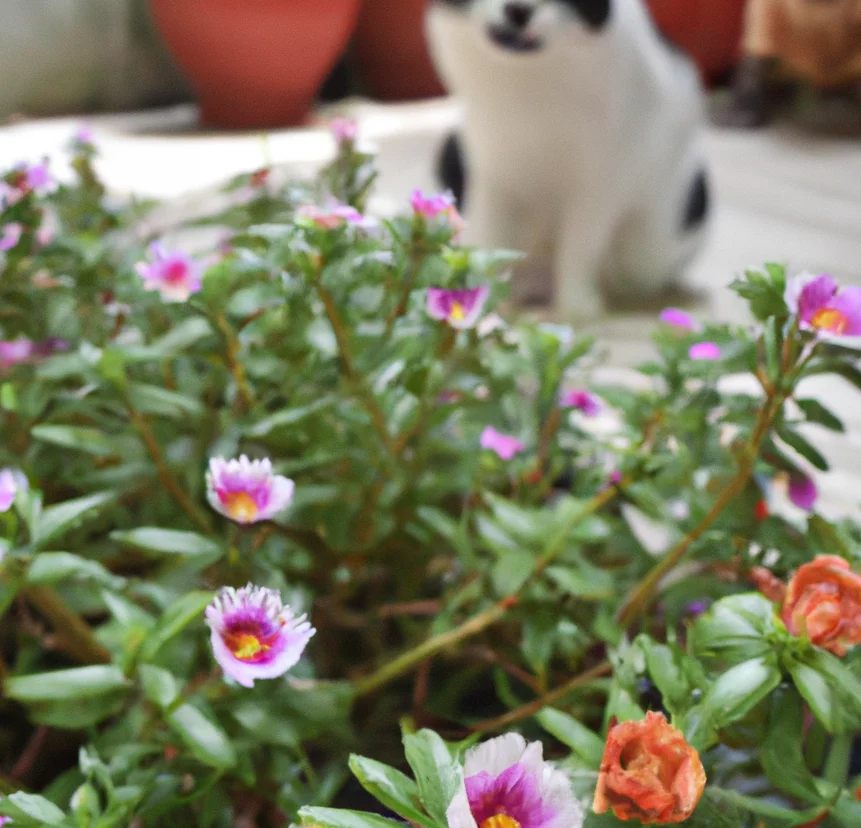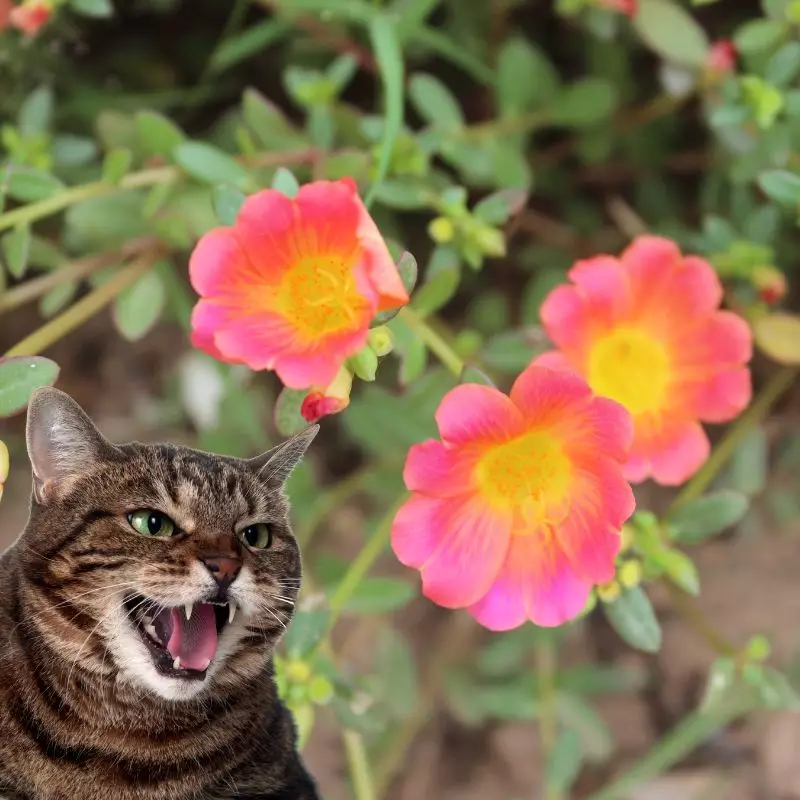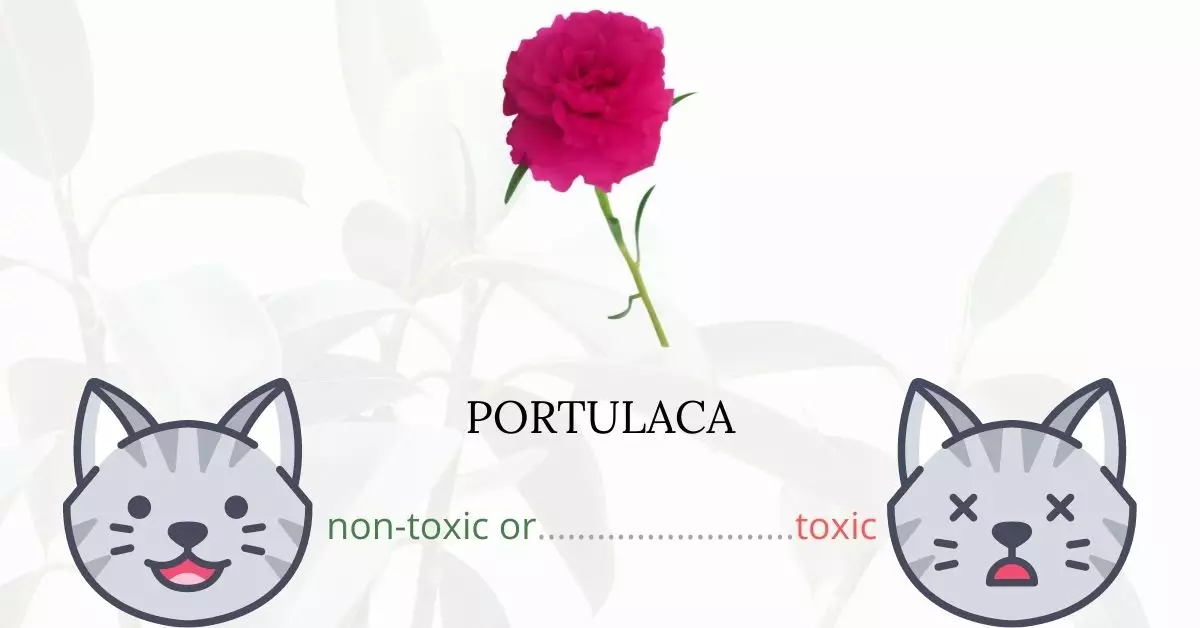Portulaca, also known by various names such as Wild Portulaca, Rock Moss, Purslane, Pigweed, Pusley, and Moss Rose, is indeed toxic to cats.
To unequivocally address this concern and provide reliable and pertinent information, this article has been crafted in collaboration with a team of experienced DVMs (doctors of veterinary medicine). The invaluable insights and expertise from these veterinary professionals have enabled us to present accurate and current information on the potential risks and effects associated with Portulaca and its impact on cats. Additionally, to ensure the reliability of the information, extensive research has been conducted utilizing high-authority sources such as ASPCA and PetMD, allowing a comprehensive understanding of the toxicity of various plants to pets.
The toxic principle in Portulaca is soluble oxalic acid. This substance is swiftly absorbed in the gastrointestinal tract and binds to systemic calcium, leading to a sudden drop in blood calcium levels, a condition known as acute hypocalcemia. This binding results in the formation of insoluble calcium oxalate which accumulates in the renal tubules, culminating in acute kidney failure. Although the majority of instances involving the ingestion of insoluble calcium oxalate occur in livestock due to their tendency to consume substantial volumes of plant matter, it poses a significant risk to smaller animals like cats, emphasizing the importance of awareness and caution among pet owners.
Clinical Signs of Portulaca Poisoning in Cats

When a cat comes into contact with, inhales, or ingests the Portulaca plant, several clinical signs can manifest, the severity of which is influenced by the amount of plant consumed and the overall health status of the cat. Particularly, cats that are dehydrated or have pre-existing chronic kidney conditions are at heightened risk.
- Weakness: The ingestion of Portulaca can lead to a significant reduction in the cat’s energy levels, primarily due to the body’s response to the toxins, compromising normal physiological functions.
- Lethargy: Cats might exhibit signs of extreme fatigue and disinterest in their surroundings. This is often a reaction to the discomfort and systemic imbalances caused by the oxalic acid in the plant.
- Hypersalivation (Drooling): The presence of oxalic acid can cause irritation to the mouth and gastrointestinal tract, leading to excessive salivation as the body’s natural response to counteract the irritation.
- Gastrointestinal Signs: Loss of appetite, vomiting, and diarrhea can occur due to the irritation and damage to the gastrointestinal tract, reflecting the body’s attempt to expel the ingested toxins.
- Tremors: These are secondary to hypocalcemia, resulting from the binding of soluble oxalic acid to systemic calcium, disrupting the normal calcium balance necessary for muscle function and nerve conduction.
- Diarrhea: This is often a direct consequence of gastrointestinal irritation and is the body’s reflex to eliminate the toxic substances from the system rapidly.
- Kidney Damage: Within 24-36 hours post-ingestion, there may be signs of kidney damage, such as altered urine output, the presence of blood in the urine, and increased thirst. This is due to the accumulation of insoluble calcium oxalate in the renal tubules, causing kidney malfunction.
Each symptom represents the body’s response to the toxic effects of the Portulaca plant, and immediate veterinary attention is crucial to manage and mitigate the effects successfully.
First Aid and Treatment of Portulaca in Cats

In most circumstances, a small amount of portulaca is enough to elicit clinical symptoms in cats. If a substantial amount has been consumed, get veterinary help right away.
If the consumption was recent, the veterinarian can start gastric decontamination by causing vomiting and giving activated charcoal to bind to any leftover plant debris in the GI system.
Additional treatments may include intravenous electrolyte solution to maintain kidney perfusion and treat hypocalcemia, antiemetic therapy, and clinical monitoring.
Recovery from Portulaca Poisoning in Cats

The prognosis for a portulaca-eating cat varies depending on how much of the plant was consumed. Because eating the leaves causes instant dental pain, most cats will not eat considerable amounts of Portulaca. This means that the majority of cats will not consume enough of the plant to cause death. If the kidneys were harmed as a result of the occurrence, the damage is very certainly irreversible.
Prevention of Portulaca Poisoning in Cats
It’s a good idea to get rid of all portulaca on your property but avoid using chemicals as it may be harmful to pets. Portulaca can be effectively removed from your property by pulling it out by hand or using garden tools. Another excellent approach to keep your cat from eating portulaca is to keep it indoors.
If you love plants but have cats at home, check out these lists:





